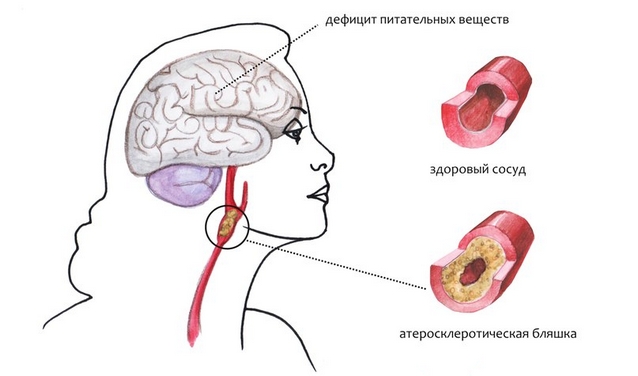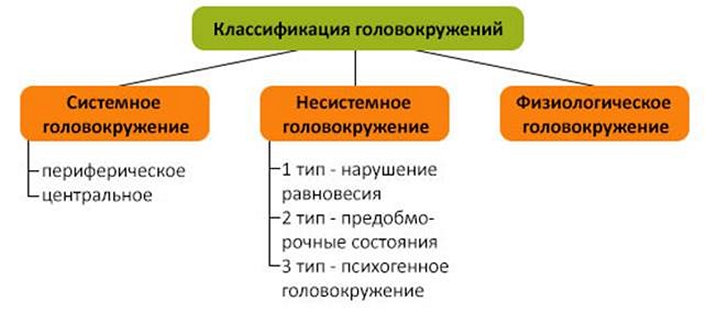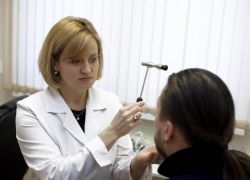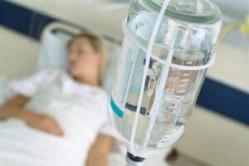Antipyretics for children are prescribed by a pediatrician. But there are emergency situations for fever when the child needs to be given medicine immediately. Then the parents take responsibility and use antipyretic drugs. What is allowed to give to infants? How can you bring down the temperature in older children? What medicines are the safest?
Why is the head spinning - this question, probably, every adult asked himself. Moreover, dizziness may indicate the development of a disease that requires the intervention of doctors, or be a variant of the norm. The reasons for its appearance are different. However, you should understand when you need to see a doctor, and when a visit to a specialist is not required.
So, the nervous system constantly and continuously receives and processes all the information that it receives from the outside through analyzers. Naturally, she is not always able to cope with this work quickly, so a person gets dizzy. In this case, the condition is not pathological.

Rollercoaster rides can make some people dizzy - here you have a quick change in body position, high speeds, and wild injections of adrenaline into the blood, leading to vasoconstriction and a lack of oxygen to nourish brain tissue
At healthy person the head may spin in such cases:
- There was a release of a large amount of adrenaline into the blood. This happens due to a stressful situation. Adrenaline causes blood vessels to constrict, which in turn causes a jump in blood pressure. There is a violation of blood circulation and the brain ceases to receive oxygen in the amount necessary for normal functioning. In this case, dizziness is a normal physiological condition.
- Too fast change of body position. The vestibular apparatus is to blame here, which is not able to instantly rebuild.
- Violation of the focus of the gaze. If the eyes look at the same point for a long time, then their muscles relax greatly. An attempt to look at another object is accompanied by dizziness.
- Strict diets or malnutrition. If you take too long breaks between meals, then the body will not receive enough glucose. This will cause dizziness.
If a person does not have any additional symptoms, then it is not necessary to run to the doctor. Dizziness will pass on its own as soon as the functionality of the nervous system is restored.
Causes of the development of dizziness, not provoked by diseases
A person may feel dizzy under the influence of such factors:
- Taking certain medications: antibiotics, antiseptics, antiallergic drugs, tranquilizers, as well as strong sedatives.

If only Gesha knew that bad habits, such as alcohol and smoking, provoke bouts of dizziness
- Bad habits. Nicotine is very dangerous, which penetrates the bloodstream and provokes the expansion of cerebral vessels. Hangover syndrome is a very unpleasant and sometimes serious condition that occurs as a result of severe poisoning of the body with ethyl alcohol. As a result of the syndrome, an increase in blood pressure occurs, thrombosis forms in small vessels, and cerebral edema appears. In the same negative way, drugs affect the brain.
Dizziness in this case appears very often, while it is not difficult to establish the cause.
What pathologies of the head can provoke dizziness?
If you feel dizzy, then the causes may be associated with brain lesions, skull injuries or other pathologies. The following diseases can provoke dizziness:
- Vertigo. This pathology is characterized by damage to the vestibular apparatus, which is responsible for the orientation of a person in space. In addition to dizziness, the patient has other symptoms: tinnitus, heart palpitations, hearing problems. Moreover, the person may experience vomiting or nausea. The presented state develops very quickly and abruptly.
- Violation of blood circulation in the inner ear.
- Meniere's pathology. Spinning in the head here develops due to excessive fluid pressure on the inner ear. The disease is also characterized by other symptoms: loss of balance, vomiting and nausea, decreased pressure. In addition, the patient's sweating increases, ringing appears in the ears. Pathology proceeds in the form of seizures and is characterized by slow progression. Treatment of such a disease involves the elimination of symptoms and slowing down its progression. However, it will not be possible to completely get rid of it - hearing will slowly decrease, up to complete deafness.
The Tel Aviv otolaryngologist tells about the causes of dizziness associated with pathologies of the vestibular apparatus medical center Vladimir Tsilker:
- Labyrinthitis. If, the cause of this condition may be an inflammatory lesion of the inner ear. The feeling of dizziness in this case is very strong, the person even staggers. This state lasts for several days and even weeks. In addition to dizziness, there is tinnitus, a feeling of congestion in them, fever.
- Damage to the nerve of the vestibular apparatus, which occurs due to tumor growth, trauma or neuritis.
- Trauma to the inner ear. Dizziness here appears due to circulatory disorders, increased fluid pressure, and nerve damage. Trauma to the inner ear often leads to the development of Meniere's pathology. Additional symptoms of the presented disease are loss of consciousness, the head is not only spinning, but it can also hurt.
- Violation of the functionality of the nervous system. This reason is quite common. Pathology is characterized by mild severity of dizziness. At the same time, the heartbeat and sweating remain normal, and the attack develops slowly and gradually.
- Traumatic brain injury. In this case, dizziness is very strong, the victim may stagger or shake. There is also nausea or vomiting. The reason for everything is cerebral edema, as well as small pinpoint hemorrhages.
- Atherosclerosis. It is characterized by a decrease in the lumen in the blood vessels due to the deposition of cholesterol plaques on their walls. At the same time, blood circulation in the brain is disturbed, which leads to its oxygen starvation. In addition to dizziness, this pathology is characterized by other symptoms: headache, impaired memory and other mental functions, increased fatigue, and insomnia.

- A brain tumor. Dizziness in this case is not constant, but manifests itself paroxysmal. The frequency and intensity of discomfort is directly affected by the size and location of the neoplasm.
- Epilepsy. This reason is also common. Dizziness in this case develops at the stage of the aura, that is, with the appearance of precursors of a convulsive syndrome. However, it sometimes replaces convulsions.
- . You need to download that this is a dangerous and progressive disease that can make a healthy person a complete invalid and lead to his death. The pathology is characterized by the appearance inflammatory process in the brain, as a result of which the sheaths of the nerves begin to collapse. If dizziness appears in the early stages of the development of multiple sclerosis, then the pathology in this case has a benign course.
- Migraine. Here the head is spinning even at the stage of the harbingers of the pain syndrome.
If the patient has frequent dizziness, then the causes can be very serious. After their elimination, the human condition returns to normal.
What is "psychogenic dizziness"?
Psychological or emotional stress provokes a large release of adrenaline, which contributes to the narrowing of blood vessels. This leads to the fact that the person will feel dizzy. If panic attack, fright or neurosis is very strong, then dizziness appears quite often, in the form of seizures. This state continues for a long time.

Reasons of an emotional and psychological nature in our time are very common. In this case, attacks of dizziness appear unexpectedly. And there are other symptoms: a false sensation of loss of consciousness, a feeling of a strong heartbeat, rapid breathing, jumps in blood pressure.
Despite the fact that a person does not have neurological disorders, he sometimes has a violation of coordination. In order to discover the true causes of dizziness, it is necessary to undergo a thorough diagnosis. As for psychogenic factors, the primary method of treatment in this case is the consultation of a psychologist or psychotherapist.
What other pathologies provoke dizziness?
If you feel dizzy, a person staggers, then this condition can be triggered by the following pathologies:
- . This is a degenerative pathology that leads to the destruction of the vertebrae of the specified section of the spine. As a result of this disease, there is an increase in bone tissue, pinching of blood vessels and nerves. The dizziness begins in the morning and does not go away until the evening. The intensity of sensations increases if the wrong or uncomfortable position is chosen for sleep. The disease is also characterized by other symptoms: pain in the head and neck, fast fatiguability, general weakness, limitation of head movements.
- Hypertension. Particularly pronounced dizziness is during hypertensive crisis- acute pathology. For the treatment of this disease, medications are needed that stabilize arterial pressure.
- Sudden acute or chronic blood loss. Due to this pathological condition, oxygen starvation of the brain develops. Of particular danger are internal bleeding, which can not always be diagnosed in time.
- Sustained pressure drop.
The opinion of the neurologist Mikhail Moiseevich Shperling about the causes and treatment of dizziness attacks:
- Vegetovascular dystonia. The diagnosis of VVD today is made to every second person, even children. The disease is characterized by a violation of the regulation of the autonomic functions of the body. For example, the tone of blood vessels decreases or increases.
- Poisoning. In this case, the body loses a significant amount of fluid due to constant vomiting, the pressure decreases significantly. In addition, nerve cells, which are affected by absorbed toxins, also experience a certain effect.
- Intestinal infections.
- Short bowel syndrome. It is the result of the removal of a significant part small intestine. This operation involves reducing the area that can absorb useful material. Therefore, the body is poorly provided with vitamins, minerals and other elements.
- Diseases of the visual apparatus.
- Stroke.
In addition, dizziness can be due to physical or psychological overwork, a strict diet or poor nutrition, as well as prolonged work at the computer. If it is known from what dizziness can be, that is, the reasons are established exactly, treatment of this pathological condition can begin.
Causes of dizziness in children
When a person staggers, everything goes before his eyes - this is a very unpleasant sensation. It has a particularly strong effect on children. The reason for the development of this pathological condition may be:
- organic or infection brain: encephalitis, meningitis.
- Acetone crisis is an excessive increase in the level of acetone in the blood.
- Migraine.
- Vegetovascular dystonia.

- serious colds.
- Poisoning by household chemicals, food, drugs.
- Head injury or severe bleeding.
- A motor disease in which nerve impulses entering the brain are inconsistent.
If a child has dizziness, finding out the causes and conducting diagnostics should be done very quickly and efficiently. Only in this case it will be possible to assign effective treatment.
What causes dizziness in pregnant women?
Pregnancy is one of the most pleasant and at the same time difficult conditions in a woman's life. It is accompanied by many inconveniences, health problems. For example, during pregnancy, dizziness can be caused by:
- Hypoglycemic syndrome, when the level of glucose in the blood is significantly reduced.
- Osteochondrosis, which is aggravated by an increase in the load on the spinal column.
- Following a strict diet.
- Iron-deficiency anemia.
For an analysis of the main causes and ways to deal with dizziness during pregnancy, see the video:
You can eliminate these factors if you follow the recommendations of the gynecologist. However, sometimes pathology speaks of the development of a serious disease that can harm not only the expectant mother, but also the baby. Therefore, during pregnancy, it is desirable to be constantly under the supervision of a specialist.
So, we have found out what can cause dizziness, now we can consider the types of dizziness:
- Central. Its characteristic feature is the sharp onset of an attack, which can last quite a long time. The result of this dizziness is an imbalance. At the same time, the intensity of sensations is moderate. With repeated attacks, a person may have speech impairment, and motor activity of one half of the body may decrease. Central vertigo may indicate problems with the functionality of the brain.
- Peripheral. It is not life threatening and is vegetative in nature. This condition is accompanied by irregular heartbeat. The functions of the vestibular apparatus are normal, so recovery after an attack is quick.

Features of the diagnosis of pathology
So, if a person has periodic dizziness, the causes are presumably established, treatment can only be started after a thorough diagnosis, which involves the implementation of such procedures:
- General analysis blood, which will help determine the level of hemoglobin and glucose.
- Dopplerography (examination of blood vessels).
- Ultrasound of the heart and electrocardiogram.
- If there is a suspicion of epilepsy, then an electroencephalogram will be needed.
- Traumatic brain injury will require echoencephalography.
- MRI or CT of the brain. These studies will help determine the state of this organ.
- Radiography of the cervical spine.
Only after a complete examination is carried out, it is possible to talk about the appointment of treatment. Perhaps the use of serious drugs is not needed, but you only have to change your lifestyle or adjust your diet. Self-diagnosis or self-treatment can be fraught with various complications. A person may simply miss the onset of a serious illness, the treatment of which depends on the speed of the reaction of specialists.
How can I get rid of an attack on my own?
If no serious pathologies are established, then the attack can be eliminated quickly enough. To do this, follow these steps:
- Better not stand. That is, it is desirable to lie down or sit down. In this case, you should breathe deeply and slowly.
- The patient needs to provide an influx of fresh air, that is, just open the window.
- Now you can massage the temples or other points. This procedure stimulates the improvement of blood circulation, and, therefore, the nutrition of tissues.
Self-acupressure head massage for dizziness (video):
Features of the treatment of dizziness
So, you can also. Although this should be done only when it is really impossible to do without pills.
It is not dizziness that needs to be treated, but its cause.
The following medications may be needed:
- Medicines used to treat diabetes, consequences of a stroke, diseases of the ears or eyes.
- Drugs that help eliminate migraines.
- Means that improve blood circulation in the brain tissues: Piracetam, Cinnarizine.

- Psychotropic drugs. They are usually prescribed in the presence of a depressive state or neurosis.
- Antiemetics: Cerucal.
- Antispasmodics: Scopolamine.
In addition, surgery may be needed, for example: in the presence of a tumor. If osteochondrosis has become the cause of dizziness, then it should be treated with massage, manual therapy and physiotherapy exercises.
You also need to adjust your diet and limit your salt intake. You must completely stop smoking and drinking alcohol. It is not advisable to abuse coffee, tea and other drinks containing caffeine.
Prevention of pathology and organization of the patient's life
If a person often has dizziness, you need to establish the cause of this condition, as well as undergo appropriate treatment. However, it is better to follow preventive measures that will not allow such a pathology to appear at all. So, it is better to follow the following recommendations:
- It is advisable not to ride on carousels, swings, and avoid riding water modes of transport if you know that they provoke dizziness attacks in you.
- You should not get up from a chair too abruptly.
- You need to go outside more often.

- Proper nutrition, and in general healthy lifestyle life will help to avoid most problems.
- It is necessary to undergo preventive examinations of doctors on time. In this case, it is possible to notice developing pathology at an early stage.
If dizziness bothers a person constantly, and it is impossible to completely eliminate the causes, it is necessary to make his life as convenient as possible:
- It is better to lay a soft floor covering on the floors. This will prevent serious injury in the event of a fall.
- Handrails should be screwed in the bathroom, which can be grabbed in case of an attack. Sometimes showers provide a chair so that you can wash yourself while sitting.
- If there are steps in the house, then they should be equipped with railings on both sides.
In any case, it is impossible to ignore this pathological condition. A timely visit to the doctor will help to avoid most problems.
Write to us in the comments about the benefits of publications or share your experience with other readers, be healthy!
Everyone has experienced dizziness at least once in their life. This disorder is not dangerous disease, but may point to it. If you are constantly dizzy, while the discomfort is accompanied by other health problems, you should immediately consult a doctor. The sooner a person starts therapy, the faster the recovery process will go.
To understand why you often feel dizzy, you need to delve into human anatomy. The vestibular apparatus, the cerebral cortex and its cerebellum are responsible for the balance of the body. In medical practice, two types of dizziness are known:
- central (brain function is disrupted);
- peripheral (failures occur in the functioning of the vestibular apparatus).
The latter type of pathology has its own characteristics. An attack of headache occurs suddenly, and its duration does not exceed a few minutes. In this case, a person may suffer from hearing loss, loss of balance, or deterioration in general well-being when turning the head. His eyes darken sharply, his face turns red or pale, and coordination of movements is disturbed.
Attacks of central vertigo are somewhat different. They are characterized by a slow increase in discomfort, but the person does not feel problems with balance or coordination. The attack itself lasts a very long time (up to several months).
The described cases of pathology should not be ignored, you should immediately consult a doctor and tell him about all the accompanying symptoms. All causes of constant dizziness can be divided into two large groups: life-threatening and not posing a threat to health. Let's consider each of the options in more detail.
Non-dangerous reasons
There is a group of factors that do not threaten the health of the body, but cause frequent dizziness:
- public speaking;
- light stress;
- seasickness;
- rapid or abrupt movement in space (for example, with sharp tilts or turns of the head);
- addictions (nicotine increases blood pressure and vasodilation);
- watching films with a dynamic plot;
- yoga and other types of fitness;
- deficiency in the body of vitamins.
These conditions usually occur as a result of a sharp release of the “extreme situation” hormone, adrenaline, into the blood. Its increased concentration causes contraction of the smooth muscles of the vessels of the brain. As a result, he experiences a lack of oxygen, which provokes the appearance of frequent dizziness.
If one or more of the factors listed above are eliminated, the condition should return to normal. Otherwise, while maintaining discomfort, you need to undergo an examination. Frequent dizziness may indicate serious problems oh health. What other causes of discomfort exist?
Pathological changes in the vestibular apparatus
Various diseases of the vestibular apparatus sometimes lead to constant mild dizziness. This condition is called "vertigo". In addition to this symptom, the disorder may be accompanied by nausea and vomiting, cold sweat, loss of balance.
Meniere's disease is one of the most common causes of dizziness. Its development is preceded by a persistent increase in fluid in the area of the inner ear or a change in the composition of the secret. The patient gradually develops selective deafness. The patient perceives quiet speech perfectly, and loud speech with difficulty. The clinical picture is often supplemented by "internal" noise and extraneous sounds.
Another type of pathology of the vestibular apparatus, which causes constant dizziness, is perilymphatic fistula. The disease is characterized by gradually increasing deafness. It is also characterized by a sharp onset of dizziness. The pathological process is based on damage to the septum that separates the inner and middle ear. The disease is always accompanied by impaired coordination. All of these symptoms are exacerbated by coughing or sneezing.
Damage to certain parts of the vestibular apparatus can lead to benign positional vertigo. It lasts only a few minutes and occurs at a certain position of the head.
Dizziness due to medication
The use of some medicines may cause permanent dizziness. These include medicines against allergies, as well as colds and sedatives. The latter contribute to the relaxation of the whole organism, resulting in this disorder.
A similar effect is characterized by drugs that are prescribed in the treatment of seizures, Parkinson's disease, antidepressants. The listed medicines, their dosage and duration of administration are determined by the doctor. Most of them are sold by prescription only. Therefore, the doctor usually warns about possible side effects in advance.
Dizziness as a symptom of serious ailments
For some diseases and disorders, the appearance of such an unpleasant symptom as dizziness is characteristic. Among them it is worth highlighting:
- Migraine. This pathology is accompanied by a large number side effects among which dizziness plays a special role. Discomfort may appear before or during an attack.
- Traumatic brain injury. The causes of frequent dizziness in people involved in sports should be sought in daily activities. Constant falls and strong blows to the head in 90% of cases end in a concussion, and in 10% - with a bruise. Pathology is characterized by the appearance of nausea and dizziness, loss of orientation in space.
- Stroke. Violation of cerebral circulation is not always accompanied by fainting or general weakness. Many patients note the appearance of dizziness as a primary symptom of an impending illness. In this case, you must immediately call a team of medical workers or call for help.
- Osteochondrosis. Changes in the cervical spine, which are degenerative in nature, can lead to chronic dizziness. This symptom is usually aggravated by tilting or sharp turns of the torso. Over time, the disease begins to progress, and concomitant symptoms only increase their intensity.
Various disorders in the work of the central nervous system also cause dizziness. It can be depression, neurosis or increased anxiety. It is impossible to independently recognize the true cause of the disorder.
Other causes of pathology
Office workers and programmers have to deal with frequent dizziness. The causes of discomfort in this case are easily explained. Long stay at the computer is reflected in the condition of the back, shoulders and neck. In these areas, muscle tone is noticeably reduced, and full blood circulation is disturbed. The eyes are in constant tension, and at the table a person often takes an uncomfortable posture. As a result of the factors described, intracranial pressure rises sharply, resulting in dizziness.
Pregnant women often come to the doctor's office to find out the causes of constant dizziness. In this case, they are easily explained. In the first and third trimesters, a woman in position has a drop in blood glucose levels, anemia, a deficiency of vitamins and some minerals in the body. These disorders are due to the birth and maintenance of a new life in the womb. Therefore, there is no reason to worry, but it is still necessary to notify the gynecologist about the problem.
If you often feel dizzy, and the causes of the disorder are unknown, you need to see a doctor. You can not uncontrollably drink pills or make compresses. Self-treatment often lubricates clinical picture, and it is difficult for the doctor to make a correct diagnosis afterwards.
Methods for diagnosing a problem
What to do if you experience severe and frequent dizziness? If the disorder does not go away on its own within a few days, you should consult an otolaryngologist. This specialist will be able to determine why the violation appeared, select the necessary treatment.
However, first the doctor needs to collect a complete medical history of the patient, study his medical history, and ask a number of clarifying questions. After that, the potential patient is sent for complex diagnostics. The survey includes the following activities:
- CT/MRI;
- blood tests, urine;
- physical examination;
- electroencephalography;
- vestibulometry;
- vascular angiography;
A comprehensive examination allows you to understand why dizziness appeared. Based on the results of analyzes and tests, the doctor must make a final diagnosis and prescribe therapy.
What to do if dizziness haunts a person every day? The treatment of a disorder always depends on its underlying cause.
For example, in pathologies of the vestibular apparatus, anti-inflammatory and antibacterial agents. The drugs themselves for treatment, as well as their dosage and duration of administration, are selected by the doctor on an individual basis. In severe cases, surgery may be required.
If the head began to spin after diagnosed osteochondrosis, you need to direct all your efforts to eliminate this ailment. First of all, the patient is prescribed medicines for the relief of neck pain, as well as anti-inflammatory drugs. To eliminate dizziness, you need to do exercise therapy, go to the pool or yoga. However, physiotherapy exercises and other sports should be carried out under the supervision of an experienced specialist. Otherwise, you can only harm your own health.
For migraines, medication is also recommended, but the choice of drugs to combat this pathology is very long. Prescriptions are suitable for one patient traditional medicine, and for others, even potent remedies do not help to stop discomfort. Therefore, in the treatment of migraine and other related disorders, qualified assistance is indispensable.
Dizziness is a serious problem that necessarily affects the quality of life. If it repeats every day, and the medicines do not save, you need to urgently consult a doctor.
Only a doctor can find out the root causes of the disease. After that, proceed directly to the therapy itself. If the cause of dizziness is hidden in addictions or prolonged work at the computer, you only need to change your lifestyle. When the disorder is a symptom of a more serious health problem, individual therapy is already prescribed.
- vascular system of the head and neck;
- system of liquorodynamics;
- cerebellum and medulla oblongata, which in combination disrupts the work of analyzers.
- sensation of tilt, rotation or rocking of surrounding objects;
- the illusion of movement is enhanced by raising or turning the head;
- nausea, vomiting, excessive sweating;
- loss of balance with the risk of falling;
- hearing loss, ringing in the ears;
- severe weakness, as before fainting;
- pallor, palpitations;
- sudden dizziness when turning the head;
- combined with headache, weakness in the muscles of the arms or legs;
- do not pass more than an hour;
- occurred in a patient with hypertension or diabetes mellitus;
- caused a fall, loss of consciousness in a patient;
- accompanied by prolonged vomiting.
- disease that is in the inner ear;
- otitis;
- migraine;
- poisoning;
- traumatic brain injury;
- perilymphatic fistula;
- osteochondrosis;
- brain tumor;
- neurosis.
- acetone crisis - in this condition in children in addition. that dizziness also appears digestive disorders and pallor;
- motion sickness;
- poisoning with household chemicals and drugs;
- vegetovascular dystonia;
- bleeding and injury and bleeding;
- infectious diseases.
- Find a place where you would be more comfortable to sit or lie down.
- Try to keep your head and shoulders at the same level. This will help normalize the blood supply to the brain. Do not make any sudden movements for a few minutes, and you will see that the dizziness will pass.
- Antiallergic drugs. It has a particularly strong effect on nervous system and the balance organ Diphenhydramine, which is currently used relatively rarely.
- The most powerful groups of antibiotics and antiseptics.
- Tranquilizers and strong sedatives.
- headache;
- a general feeling of depression, weakness;
- bad mood and decreased emotional background;
- nausea and vomiting .
- Meniere's disease - as a rule, a unilateral lesion of the labyrinth of a non-inflammatory nature;
- vestibular schwannoma ( benign tumor), or acoustic neuroma;
- Bacterial and viral diseases labyrinth - labyrinthitis due to untreated otitis media, after suffering influenza, measles, rubella;
- Acute peripheral vestibulopathy (vestibular neuronitis) is a complication after acute respiratory infection in the form of a lesion of the vestibular apparatus;
- Benign paroxysmal (paroxysmal) dizziness - in 50 - 75% of cases, the cause of such attacks cannot be established, then they speak of idiopathic dizziness. Characterized by the occurrence of seizures at night or morning hours at the slightest turn or tilt of the head. Attacks are short-term, occur several times a day or a week, then cease to disturb the patient for several weeks, and then reappear;
- Damage to the brain in the region of the vestibular nuclei and the cerebellum - tumors, injuries, stroke in the acute and subacute periods.
- Neurological diseases - epilepsy, demyelinating ( multiple sclerosis), infectious (meningoencephalitis), tumor processes of the brain, increased intracranial pressure;
- Psychogenic diseases - neurosis associated with constant stress, depression, anxiety personality disorder;
- Diseases of the middle and inner ear - otitis media, barotrauma (may occur in divers, divers during a sharp dive on great depth), acoustic neuroma;
- Diseases of the visual apparatus - diabetic retinopathy (retinal pathology), cataracts, glaucoma;
- Diseases of the musculoskeletal system and the associated violation of blood flow through the vessels of the neck and head, for example, with cervical osteochondrosis or the consequences of a spinal injury in the cervical region, the carotid arteries, which bring blood and oxygen to the cranial cavity, suffer;
- Cerebral circulation disorders - acute (stroke) and chronic (dyscirculatory encephalopathy);
- Diseases of the heart and blood vessels - sick sinus syndrome, bradycardia, atherosclerosis of the aorta and carotid arteries, arterial hypertension and hypertensive crisis;
- Migraine;
- Early and late consequences of traumatic brain injury;
- Pathological conditions that occur during pregnancy and not only - preeclampsia (preeclampsia), anemia, decreased blood glucose levels, lack or absence of vitamins in the body.
- severe weakness;
- vision problems;
- noise in ears;
- headache,
- noise in ears;
- nausea;
- headache,
- computed and magnetic resonance imaging;
- ultrasound examination;
- x-ray;
- study of the body using radioisotopes;
- biochemical analyses.
- Quite often, dizziness is accompanied by nausea. In this case, do not try to restrain yourself.
- If you feel very dizzy, the first thing you should do is lie down immediately. The head and shoulders should be at the same level, in this position the blood supply to the brain improves.
- Lie down, preferably in a dark room. Place ice or a towel soaked in cold water on your forehead.
- Close your eyes or fix your eyes on some fixed object.
- Drink cold strong coffee.
- Peppermint infusion. Especially useful for dizziness in the morning.
- Drink instead of tea after lunch and dinner and the problem will pass.
- Include phosphorus-rich foods such as fish, nuts, cheese, and eggs in your daily diet more often.
- For 1 cup boiling water, brew like tea, 1 tbsp. a spoonful of melissa
- Before meals 1 tbsp. a spoonful of seaweed.
- Nettle decoction. 1 st. pour a spoonful of nettle 0.5 cups of boiling water and leave for 4 hours. Strain, add 100 ml. apple juice and drink three times a day 20 minutes before each meal.
- 10 ml. juniper oil, 30 ml. fir oil, 100 ml. Mix 100% camphor oil, shake well. When dizzy, we lubricate the points above the eyebrows, above the upper lip, temples, behind the ears.
- Slowly tilt your head forward towards your chin as low as possible. And also, very slowly without tension, lift.
- Alternately tilt your head to the right and left to the shoulder. Do it very slowly.
- With your head you need to describe the eight from left to right, then down and forward.
- The same as in the previous exercise, only in the vertical and horizontal direction.
Dizziness can occur due to eighty different reasons. The head may spin for a harmless reason - for example, due to hunger or fatigue. If you periodically feel dizzy, there is a good chance that this is a symptom of the disease.
Accurate diagnosis with MRI and ultrasound
Find the cause, find the solution
Initial appointment with a neurologist free of charge
Why is my head spinning
"What can make your head spin?" - patients ask our doctors. Often dizzy after a rapid rise from a chair, bed, or sharp turns in different directions. Despite the fact that it usually lasts no more than a minute, which is already a sign of the disease.
With dizziness, the orientation of the body in space is disturbed. The vestibular, visual and tactile systems are responsible for the correct orientation. Dizziness occurs when mismatched information enters these systems. As a result, a person loses stability, it seems to him that the objects around him are moving.
This happens, as a rule, when the following systems are violated:
Dizziness is true and false, they are easy to confuse. True dizziness lasts from a couple of minutes to several hours and may recur. If the disease is not treated, after a few months, nausea, vomiting, and tinnitus may appear.
Symptoms of dizziness
Vestibular vertigo occurs without obvious causes and accompanies many serious diseases.
Symptoms of dizziness:
You should immediately consult a doctor if the symptoms of dizziness:
Causes of dizziness
The causes of dizziness in men and women are varied. It is caused by the following diseases.
| Disease name | Manifestations |
|---|---|
| Vegetovascular dystonia | Frequent dizziness appears when you try to stand up or turn abruptly, and then pass. |
| Diseases of the cervical spine - trauma, osteochondrosis, spondylosis | The feeling of disorientation and unsteadiness is aggravated by movement of the neck, strong pain in the neck. |
| Migraine | Hearing loss, ringing in the ears. |
| Benign positional vertigo | Severe dizziness lasts from a few seconds to a minute, appears with sudden movements of the head. |
| Psychogenic dizziness | Occur in emotional people. Accompanied by confusion, fear of falling and injury, circling objects and the body. |
| Violation of the blood supply to the inner ear and parts of the brain | Pain and tension in the neck, dizziness occurs after prolonged sedentary work. |
| Anemia | One of the most common causes of dizziness in women. Other symptoms include pallor, increased fatigue and weakness, and fainting. |
| Vertebrobasilar insufficiency | Accompanied by nausea, vomiting, blurred vision. Without treatment, the disease can become chronic. |
| Cervical injuries | First, there is tension in the neck muscles due to a long stay in one position. This tension first develops into muscle pain, and then into a dull headache rising up the back of the head. |
Treatment Reviews
Thank you for your work! It is even difficult to part with you, for a short time You have become very close and dear to me. I don't really like to visit medical institutions, so as not to be disappointed. But I leave you very satisfied, and most importantly in good condition (excellent) health and peace of mind. I hope to return to you and not alone. I have a lot of friends who need your qualified (highly) services.
Diagnostics
Many causes of malaise create difficulties for diagnosis, which only a specialist can handle. With constant dizziness, we recommend that you contact a neurologist.
Our doctor will ask you about the symptoms, conduct an examination, distinguish true dizziness from another disease. For an accurate diagnosis, you need comprehensive examination. Doctors of the clinics "Masterskaya Zdorovya" in St. Petersburg use the following diagnostic methods:
Treatment of dizziness in the "Workshop of Health"
Our doctor makes an individual course of treatment for each patient. It takes into account the cause of dizziness, age, gender and characteristics of the patient's body. The course includes at least five different procedures. Treatment takes 3 to 6 weeks.
The patient undergoes procedures 2-3 times a week. Relief occurs after the first week of treatment. The course is based on the following procedures:
Resonance wave therapy is a method of therapeutic effect on the aquatic environment of the body with low-intensity high-frequency electromagnetic waves.
Intra-articular injections of Fermatron are effective method treatment various diseases musculoskeletal system by introducing a drug (chondroprotector) into the affected joint.
Treatment of the spine and joints using the Thera-Band simulator will restore limb mobility in a short period of time without expensive treatment in specialized sanatoriums.
Joint blockade is a type drug treatment spine and joints, aimed at cupping acute pain, relieve inflammation and muscle spasms.
Drug treatment of joints and spine in the clinic "Health Workshop" is used in a wide range and in combination with physiotherapy. Intra-articular injections, blockades and droppers.
Hyaluronic acid is an important component of synovial fluid that protects cartilage tissue from abrasion, prevents deformation of the joint.
The doctor acts with acoustic waves on bone outgrowths and seals in the muscles. UVT removes salt deposits, calcifications, improves joint mobility.
The impact of low-frequency electrical impulses relieves inflammation and swelling, normalizes the functioning of the affected nerves, and stops the breakdown of cartilage tissue.
Exposure to laser, ultrasound, electric current and other physical factors relieves pain, improves blood circulation and tissue nutrition, and accelerates the removal of toxins.
Dizziness- this is not a disease, but a symptom that reflects the state of the nervous, cardiovascular, and sometimes digestive, hematopoietic and other systems of the human body. The importance of this feature cannot be underestimated. Therefore, if you feel dizzy, you need to identify the causes by choosing a suitable examination program.
Non-dangerous causes of dizzinessDo you have frequent dizziness and you do not understand what exactly makes you dizzy? The reasons for this phenomenon can be not only pathological, but also physiological. For example, very often dizziness provokes the release of adrenaline into the blood. This is due to the fact that the increased content of adrenaline causes a sharp vasospasm, which is why the human brain receives much less blood than he should, and then there is an illusion of dizziness.
The reasons that the head is very dizzy can also be hidden in poor focus or in a false perception of the environment. This mostly happens at high altitude, on carousels or when riding fast. various types transport, when our brain is ready for one view, and we actually see a completely different reality.
Are you dizzy and have weakness? The reasons for this phenomenon are very diverse. These may be factors that, if eliminated, you will no longer feel dizzy.
Strict diet
With improper nutrition, a sufficient amount of glucose does not enter the bloodstream, which first causes dizziness and weakness, and then weakens the immune system.
Sharp and inaccurate head turns
Unsuccessful and rapid movement of the head leads to disruption of the blood supply to the brain and the person experiences difficulty in coordinating movements and dizziness.
Taking certain medications
Sometimes dizzy and when taking hypoallergenic drugs, potent antiseptics, antibiotics, sedatives and tranquilizers.
Dizziness as a symptom of illnessIn some cases, when dizziness is frequent, the cause of dizziness may be a violation of the normal functioning of vital processes in the body. It can be:
Therefore, if you constantly feel dizzy, you need to identify the causes and undergo a course of treatment, and for this you will consult a doctor.
Dizziness in a child is most often provoked by the same reasons as in an adult. But the most common among them, which are characteristic of the child's body, are:
Head spinning in the morning, and you do not know the reason for this phenomenon? The sensation of the illusion of movement very often appears immediately after sleep.  Just try to keep your balance:
Just try to keep your balance:
If you are constantly dizzy, try to identify the causes, since the “treatment” of an attack will not save you from the underlying disease or pathological condition.
When you feel dizzy, you cannot even move around the apartment, because you are slightly swaying or even very skidding. The vestibular apparatus failed - a partial loss of orientation. If this condition does not go away and is repeated more and more often, then you ask yourself questions: “Why is my head spinning?” and "How to treat dizziness?". In any case, to determine the cause, you need to remember how you felt in previous days. Have you already had at least short-term, for a few seconds, disconnections of the vestibular apparatus? Did you "drive" while sitting in front of the TV or at your desk in the office? Severe dizziness does not suddenly arise, there are always some prerequisites, short-term signals that you simply did not pay attention to before because of the large amount of work, study, current worries.
Dizziness belongs to the category of fairly common pathologies. All people at least once encountered the illusion of movement of the torso or surrounding objects. Sometimes this condition occurs with sudden movements. For some people, it appears when getting out of bed or in a dream. Many people have an occasional feeling as if they are dizzy, which, although not a disease, may be a symptom of some other disease. There are a great many reasons for such an ailment, from fairly “safe”, in which the symptoms are rare, episodic, to very serious, in which the head is constantly dizzy. The frequency of occurrence of symptoms almost always indicates possible problems with health.
Causes of dizziness in a healthy person
The vestibular apparatus determines the level of balance felt by a person. It is located in the area of the inner ear, from where periodic signals come to the nerve cells and the temporal region of the cerebral cortex - this is the mechanism of the internal control of the human body over the position of the body. Any disturbances in the impulse transmission of information to the brain lead to a partial loss of a sense of balance. Dizziness is not a disease, but just one of its signs - symptoms, something like a headache or high fever. Attacks of dizziness can be extremely rare and inexpressive, or they can be persistent and have a strong impact not only on well-being, but also on the quality of life, and even on working capacity. In the first case, this is, as a rule, a natural reaction of a healthy person to strong external stimuli.
severe fatigue
Fatigue is one of the most common causes. The body can function optimally and smoothly only under the condition of its regular psychological and physical unloading. That is, a person needs a good rest no less than water or food. If you do not get enough sleep, get very tired, and even worse - combine these two factors, dizziness is a completely expected phenomenon. If you do not bring the matter to a chronic state, then everything, as a rule, passes within a few days after the restoration of sleep and rest.
Unexpected severe stressful situation
Failing an exam, going on stage in front of thousands of people, skydiving, and so on and so forth. Here are the examples in question. What happens in such cases at the physiological level? A powerful and sharp release of adrenaline into the circulatory system is carried out. Due to the influence of this hormone, in such large quantities, blood vessels in the brain are compressed (their short-term spasm occurs), as a result, normal oxygen supply and metabolism are disturbed for some time. The natural result - a person's head is spinning.
Starvation or avitaminosis
And one should not think that only a long absence of food can provoke an imbalance that manifests itself in the form of an attack of dizziness. Quite the opposite: with prolonged fasting, the body has time to adapt to it and rebuild its metabolism to the current situation. But with an irregular diet, sharp drops in blood glucose levels can occur. There were carbohydrates - and no carbohydrates. The brain does not understand what is happening, because it requires a lot of energy. And she is not. This can also make your head spin.
Rapid movement, focus failure
Usually the head begins to spin with a sudden change in the position of the body. This condition often appears when the head is tilted. As a rule, such discomfort is temporary and disappears on its own. For example: carousel traffic. This also includes "seasickness". The brain receives information for processing excessively often, as the surrounding objects flicker before the eyes at breakneck speed. He does not have time to analyze it, there is a "confusion".
Regarding focus: if you look somewhere far away for a long time, and then look at an object located nearby, your eyes may not have time to adapt, and the pupil may narrow. The result is fog before the eyes and slight dizziness. Here much depends on the tone of the pupils.
Dizziness while lying down
If you abruptly change the position of the body from vertical to horizontal, specific dizziness may occur. Many describe it like this: "It feels like I'm floating away." Don't worry if this feeling is irregular. It may be a characteristic sign of such a benign positional disorder.
The fact is that the vestibular apparatus has receptors in its composition. They, in the process of life, die, while a chemical reaction takes place with the release of particles of calcium carbonate. It is this substance, at its certain concentration in the blood, that provokes dizziness.
Feeling dizzy after taking medication
The annotations for many drugs indicate that after taking the patient may feel dizzy. But in some medicines this property is especially pronounced:
In general, dizziness is a characteristic by-effect many drugs that act on the nervous system.
Bad habits that cause dizziness
Often at a doctor's appointment, you can hear a complaint of this kind: "when I smoke, my head is spinning." While smoking, all people get a little dizzy. This is due to the fact that nicotine, penetrating into the blood, dilates the vessels of the brain. Dizziness - feature hangover syndrome. In this case, the symptom is associated with poisoning with ethyl alcohol and products of its processing in the body. There is swelling of the brain, thrombosis of its small capillaries, increased blood pressure. Against the backdrop of these pathological changes A person is also worried about other symptoms:
Diseases associated with dizziness
Sometimes dizziness is a manifestation of quite dangerous disorders. For example, the head is spinning due to the fact that there is a lack of coordination in the operation of sensory functions. Frequent bouts of disorientation can be a manifestation of vegetative-vascular dystonia. It can talk about the development of diabetes and atherosclerosis. Sometimes this condition appears with hypertension, but it can also occur with normal pressure. Depending on whether a pathological process has occurred in the inner ear or not, systemic (true, vestibular) and non-systemic (non-vestibular) vertigo are distinguished.
Systemic dizziness is characterized by a clear sensation of rotation of objects around the body or rotation of the body itself in space and occurs when the vestibular apparatus or the nerve nuclei of the brain responsible for coordination and balance are affected. It occurs in 25% of all cases of symptoms described by the patient as a condition in which the head is spinning. In the rest - signs of non-systemic dizziness.
Systemic vertigo is characteristic of diseases such as:
Non-systemic dizziness is characterized various symptoms, described by the patient as a feeling of lightheadedness, nausea, unsteady gait, fainting with flies before the eyes and tinnitus and can occur with such diseases:
If you have ruled out all factors provoking dizziness, and unpleasant symptoms persist, you should consult a doctor to conduct an examination for a disease that could cause such a condition.
When to See a Doctor
Despite the presence of reasonable and relatively normal options when dizzy, with frequent repetition of such unpleasant symptoms you should contact the experts. High or low blood pressure is one of the most common causes of dizziness in women. People for whom the differences blood pressure have become a common, often recurring phenomenon, they also experience frequent dizziness.
If you are simultaneously experiencing symptoms such as:
then an ambulance call is simply necessary for you. The fact is that dizziness in combination with loss of consciousness, loss of strength and coordination of movements, as well as headache, are signs of an acute violation of cerebral blood flow and, possibly, a stroke.
If, in addition to dizziness, you also feel:
then these may be symptoms of a traumatic brain injury, toxic poisoning or migraine.
Diagnostics
The correct treatment of patients who often feel dizzy should be chosen by the doctor. Since the head is spinning with a wide variety of diseases and infections, he usually prescribes a comprehensive study, which may include:
Treatment of any type of dizziness should begin only with a visit to the doctor. Most importantly, apply medical care during.
What to do if you feel dizzy
Huge benefit in dizziness, and not only with them, will bring you daily douche. Do not start abruptly, pour over your feet first, let the water be at room temperature at first, gradually make it more and more cool.
If you feel dizzy - folk remedies will help
Coordination and balance exercise
In conclusion, I want to give you a set of exercises that will help you cope with constant dizziness, but on the condition that you perform them regularly.
If you are constantly dizzy, while you experience weakness or nausea, be sure to contact a neurologist, and describe to him as precisely as possible everything that you feel at the same time. A detailed and detailed description will help the specialist to understand and correctly diagnose.





